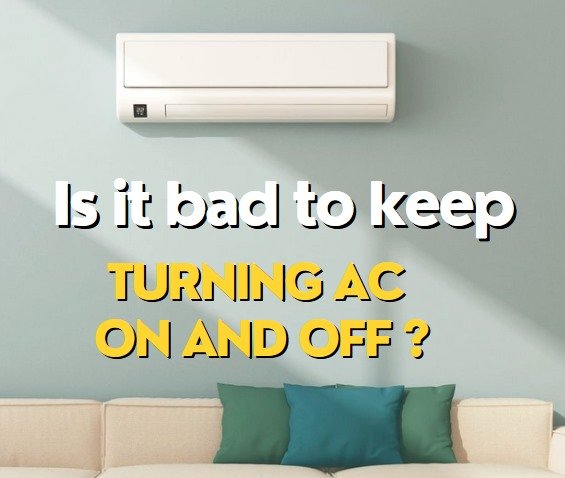The temperature is pleasant—not too hot—and spring is in the air. When the temperature rises into the upper 60s, a standard error made by homeowners, is it bad to keep turning AC on and off? However, did you realize there is a thin line between saving money on energy and inadvertently increasing costs?
You could need an air conditioning replacement earlier if you turn your air conditioner on and off. In this piece, we’ll talk about when to shut off your air conditioner and when to leave it alone.
Turning AC On and Off vs. Leaving It On
Is it bad to keep turning your AC on and off to save energy, or is it more energy-efficient to leave it on throughout the day? This question is crucial for homeowners seeking to cool their homes effectively without incurring high energy costs.
What appears to be a straightforward question is a bit more nuanced. This inquiry consists of two parts. First, when attempting to maximize the energy usage of your air conditioner, it would be beneficial to consider the distinction between on and off or auto and off.

“ON” vs. “AUTO” — Which Costs More?
“AUTO” would appear to be the more expensive choice. After all, current air conditioners are designed to run for shorter periods but more often. While you might think the ‘AUTO’ setting would consume more energy, it’s the ‘ON’ setting that tends to be less energy efficient.
When the AC is set to ‘ON’, it works harder and continuously, consuming more energy than the ‘AUTO’ setting.
- “ON” Setting: Your AC fan constantly runs throughout the day, circulating air around your home.
- “AUTO” Setting: When the temperature on your thermostat is reached, your air conditioner’s fan and the rest of the cooling system turn off.
Like a straw, air conditioners draw moisture out of the atmosphere. Moisture accumulates on the coils of the system. Air conditioner’s coils break in the air stream while you set the fan on “AUTO,” which gives the condensation time to drop into the drain pan.
If the fan is switched “ON,” less condensation might evaporate due to the ongoing introduction of more moisture. A small amount of moisture might be forced back into the atmosphere or freeze on your air conditioner’s coils, obstructing them.
When to Turn Off AC and Open the Windows
Unlike smaller appliances, your HVAC system is designed to maintain a consistent temperature in your home. Frequently turning it on and off can cause it to work harder than necessary, leading to increased wear and tear and higher energy consumption.
Massive machinery like air conditioners require a lot of energy to start up. Additionally, air conditioners are designed to function as efficiently as possible, even running at full capacity. For dehumidifying your home, they work best then as well.
Your home becomes hotter, and your energy bill rises due to your AC turning on and off frequently, which makes things worse for you.
Additionally, it puts more stress on your AC unit, which might cause it to age prematurely and force you to replace it immediately.
When Should I Turn Off My Air Conditioner
It makes sense to turn off your air conditioner only when it’s cold enough to open your windows and allow the outside air to keep your home’s temperature comfortable.
But that doesn’t mean you can’t reduce energy use even when nobody is home. Raise your thermostat around 3-5 degrees before you go to work in the morning. This method is to reduce the strain on your system all day.
To save electricity while you’re gone, you may adjust your thermostat by 5 to 10 degrees before leaving for vacation.
The simplest method is with a thermostat, which will adjust its settings automatically and restore comfort to your house as soon as you enter.
When the weather is pleasant, there are a few situations when you can leave your air conditioner off:
- If You’re Opening the Windows
Open the windows for your home’s indoor air quality in the spring. Consider that your home has primarily been circulating the same stale air for the previous six months. Springtime window openings allow fresh air entry, which subsequently occurs throughout the house.
To avoid paying more energy costs, turn off your air conditioner if you plan to leave the windows open for a prolonged time.
- If You’re Planning to Leave It Off for a Long Time
A long time is something that lasts more than four hours. So it’s OK to switch off your air conditioner when you’re at work or the weather is beautiful enough that your house doesn’t require air conditioning.
When You Shouldn’t Turn Off Your AC
Want to postpone replacing your AC? Whenever possible, keep your central air conditioner on when:
- When the inside is too chilly, instead of turning off your air conditioning, is it wrong to keep turning ac on and off?
- While you’re going outside for a bit, you’ll spend less money if you leave it on if you’re only gone for a few hours.
Read also: Symptoms of Low Freon in Central Air Conditioners
Role of Ceiling Fans
Using a ceiling fan in conjunction with your AC can also effectively cool your home more efficiently. Ceiling fans help circulate cool air throughout the room, allowing you to set a higher temperature on your AC without compromising comfort, thus saving energy.
Final Takeaway
There is a fine line between reducing energy expenditures and unintentionally driving up prices. For example, air conditioners are made to run more often and for shorter periods. Suppose you’re trying to maximize energy usage. Then you ought to consider the distinctions between automatically turning the air conditioner on and off or on and off.
Turning off your air conditioner only when it’s cold enough outdoors to open your windows makes sense. Is it bad to keep turning ac on and off at work or when the outside temperature is so pleasant that your home doesn’t need air conditioning?


